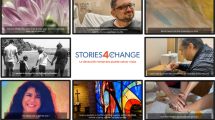Abstract
The tradition of storytelling is an integral part of Alaska Native cultures that continues to be a way of passing on knowledge. Using a story-based approach to share cancer education is grounded in Alaska Native traditions and people’s experiences and has the potential to positively impact cancer knowledge, understandings, and wellness choices. Community health workers (CHWs) in Alaska created a personal digital story as part of a 5-day, in-person cancer education course. To identify engaging elements of digital stories among Alaska Native people, one focus group was held in each of three different Alaska communities with a total of 29 adult participants. After viewing CHWs’ digital stories created during CHW cancer education courses, focus group participants commented verbally and in writing about cultural relevance, engaging elements, information learned, and intent to change health behavior. Digital stories were described by Alaska focus group participants as being culturally respectful, informational, inspiring, and motivational. Viewers shared that they liked digital stories because they were short (only 2–3 min); nondirective and not preachy; emotional, told as a personal story and not just facts and figures; and relevant, using photos that showed Alaskan places and people.

Similar content being viewed by others
References
Lanier A, Hollck P, Kelly J, Smith B, McEvoy T (2001) Alaska Native cancer survival. Alaska Med 43(3):61–69
Kelly J, Schade T, Starkey M, Ashokkumar R, Lanier AP (2012) Cancer in Alaska Native People 1969–2008 40-year report. Alaska Native Tumor Registry Alaska Native Epidemiology Center Division of Community Health Services Alaska Native Tribal Health Consortium, Anchorage
US Preventive Services Task Force. http://www.uspreventiveservicestaskforce.org/BrowseRec/Index/browse-recommendations. Accessed 15 Dec 2014.
American Institute of Cancer Research. http://www.aicr.org/reduce-your-cancer-risk/recommendations-for-cancer-prevention. Accessed 16 Dec 2014.
Mayo W, Natives of Alaska (2002) Alaska Native ways: what the elders have taught us. Graphic Arts Center, Portland
Hodge FS, Pasqua A, Marquez CA, Geishirt-Cantrell B (2002) Utilizing traditional storytelling to promote wellness in American Indian communities. J Transcult Nurs 13(1):6–11.7
Cueva M, Kuhnley R, Lanier A, Dignan M (2007) Story: the heartbeat of learning. Convergence 39(4):81–88
Kreuter M, Wray R (2003) Tailored and targeted health communication: strategies for enhancing information relevance. J Health Behav 27(suppl):227–232
Kreuter M, McClure S (2004) The role of culture in health communication. Annu Rev Public Health 25:439–455
Kreuter M, Buskirk T, Holmes K et al (2008) What makes cancer survivors stories work? An empirical study among African American women. J Cancer Survivorship 2:33–44
Cueva M, Kuhnley R, Revels L, Cueva K, Dignan M, Lanier A (2013) Bridging storytelling traditions with digital technology. Int J Circumpolar Health 72(20717):270–275
Lambert J. Center for digital storytelling. www.storycenter.org. Accessed 12 Nov 2014.
Lambert J (2009) Digital storytelling capturing lives, creating community. Digital Diner, CA
Kajder S, Bull G, Albaugh S (2005) Constructing digital stories. Learn Lead Technol 32(5):40–42
Oppermann M (2008) Digital storytelling and American studies: critical trajectories from the emotional to the epistemological. Arts Humanit High Educ: Int J Theory Res Pract 7(2):171–187
Sandars J, Murray C (2009) Digital storytelling for reflection in undergraduate medical education: a pilot study. Educ Prim Care 20:441–444
Sandars J, Murray C, Pellow A (2008) Twelve tips for using digital storytelling to promote reflective learning. Med Teach 30:774–777
Barrett H (2005) Researching and evaluating digital storytelling as a deep learning tool. http://electronicportfolios.com/portfolios/SITEStorytelling2006.pdf. Accessed 11 Dec 2014.
McLellan H (2006) Digital storytelling in higher education. J Comput High Educ 19(1):65–79
Benmayor R (2008) Digital storytelling as a signature pedagogy for the new humanities. Arts Humanit High Educ: Int J Theory Res Pract 7(2):188–204
Cumming GP, Currie HD, Moncur R, Lee AJ (2010) Web-based survey on the effect of digital storytelling on empowering women to seek help for urogenital atrophy. Menopause Int 16(2):51–55
Dewey J (1934) Art as experience. Perigree Books, New York
Denzin N, Lincoln Y, Tuhiwai-Smith L (2008) Handbook of critical and indigenous methodologies. Sage, CA
Tuhiwai Smith L (2005) Decolonozing methodologies: research and indigenous peoples. University of Otago Press, Dunedin
Denzin L, Lincoln Y (2000) Handbook of qualitative research. Sage, CA
Wexler L, Gubrium A, Griffin M, DiFulvio G (2013) Promoting positive youth development and highlighting reasons for living in northwest Alaska through digital storytelling. Health Promot Pract 14(4):617–623
Acknowledgments
The Alaska Native Tribal Health Consortium received support from the National Cancer Institute of the National Institutes of Health under Award Number R21CA163163 in September 2013. The award funded research to increase understanding of digital storytelling as a culturally respectful and meaningful way for Alaska’s village-based community health workers (CHWs) to create and share cancer prevention and screening messages with Alaska’s communities. Co-funding for this 2-year award was provided by the Office of Behavioral and Social Sciences and from the Office of Disease Prevention. Thank you to Alaska’s community health workers who created their personal cancer-related digital story as a powerful health messaging tool.
Author information
Authors and Affiliations
Corresponding author
Additional information
Research reported in this publication is solely the responsibility of the authors and does not necessarily represent the official views of the National Institutes of Health.
Rights and permissions
About this article
Cite this article
Cueva, M., Kuhnley, R., Revels, L. et al. Engaging Elements of Cancer-Related Digital Stories in Alaska. J Canc Educ 31, 500–505 (2016). https://doi.org/10.1007/s13187-015-0826-z
Published:
Issue Date:
DOI: https://doi.org/10.1007/s13187-015-0826-z




